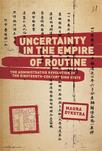Maura Dykstra
Assistant Professor of History
On Leave:
Academic Year 25-26
Office:
HQ 259
Phone:
203-432-4589
Fields of interest:
Early modern China; Ming and Qing China; empire and governance; legal history; bureaucratic history; institutional history; economic history; municipal governance; histories of information and administration
Bio:
Maura Dykstra is a historian of Ming and Qing China with an interest in comparative histories of empire and the transition from empire to nation-state. She maintains an active research interest in the institutions of governance and administration at the local level, in the imperial capital, and in the many offices between the center and locale. Many of her recent and current projects revolve around questions about the use of text to represent local realities in imperial contexts.
Dykstra’s first book, Uncertainty in the Empire of Routine: The Administrative Revolution of the Eighteenth-Century Qing State (Harvard University Asia Center Press, 2022), traces the “double-stranded tale of the development of the Qing bureaucracy and its archive” from the hundred years after the Qing conquest of the Ming to the middle of the eighteenth century,
Her next book-length project continues several of the lines of inquiry from her first book, including its focus on the relationship between textual practices of administration and the epistemological foundations of the state, into county-level archives and administration. This forthcoming project reviews the evolution of the material practices of day-to-day administration in the counties of the Qing Empire over the course of the nineteenth century.
One of the main focal points of this project—the local litigation cases whose rediscovery and wide use by scholars in the late 1990s and early 2000s revolutionized the field of Chinese legal history—is the foundation of several new reflections about the relationship between code and case in the institutional context of imperial Chinese law. This interest in and attention to the material and procedural foundations of law and administration in Chinese history inspired Dykstra to create a five-year working group on the Chinese Legal Tradition, which is hosted by the Max Planck Institute for Legal Theory and Legal History.
A third book-scale research endeavor covers the history of Ming and Qing colonization of the Southwest, with a focus on the Sichuan-Hunnan-Guizhou border region. Some of her thoughts about how to re-frame the colonization of the Southwest as a part of the broader history of the Ming and Qing Empires are at the heart of her undergraduate lecture course H315, “State of War: Conflict, Conquest, and Consolidation in Late Imperial China.”
In addition to the above-listed institutions which have hosted her research and multi-year projects, Dykstra has held fellowships and residential positions at East China Normal University, the Taiwan Center for Chinese Studies, The Tokyo University Graduate School of Law and Politics, the Max Planck Institute for the History of Science, and the Harvard University Fairbank Center for Chinese Studies.
Recent Publications
Uncertainty in the Empire of Routine: The Administrative Revolution of the Eighteenth-Century Qing State. Cambridge, Mass.: Harvard University Asia Center Press. 2022.
“A Crisis of Competence: Information, Corruption, and Knowledge about the Decline of the Qing State,” Journal of the History of Knowledge 1, no. 1 (2020). (https://doi.org/10.5334/jhk.11
“Growing up before the Rebellion: Merchant Organization and Local Administration in Chongqing,” Late Imperial China 43, no. 1 (June, 2022): 1-42. (https://doi.org/10.1353/late.2022.0003)
Selected Awards
Caltech Richard P. Feynman Prize for Excellence in Teaching – 2021
HSS Brass Award for Diversity, Equity, and Inclusion – Caltech Division of Humanities and Social Sciences 2021
Dr. Fred Shair Programming Diversity Award – Caltech Center for Inclusion and Diversity – 2021
ASCIT Teaching Award – Caltech Associated Students – 2019
The Henry Luce Foundation/ACLS Program in China Studies Grant – 2015-2016
Thomas Lifka Dissertation Prize Winter 2014
HSS Brass Award for Diversity, Equity, and Inclusion – Caltech Division of Humanities and Social Sciences 2021
Dr. Fred Shair Programming Diversity Award – Caltech Center for Inclusion and Diversity – 2021
ASCIT Teaching Award – Caltech Associated Students – 2019
The Henry Luce Foundation/ACLS Program in China Studies Grant – 2015-2016
Thomas Lifka Dissertation Prize Winter 2014
Period:
Early Modern
Geography:
China
Thematic:
Economic
Empires & Colonialism
Legal
Political
Spatial/Geographic
War & Society

